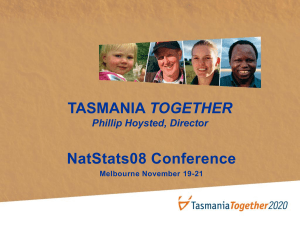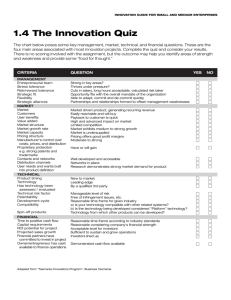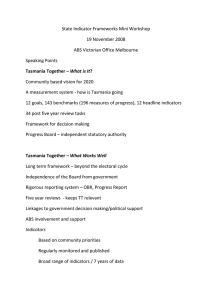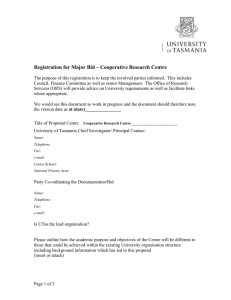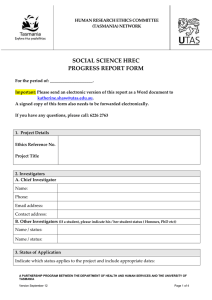Patmalar Ambikapathy (MS Word Document 39.5 KB)
advertisement
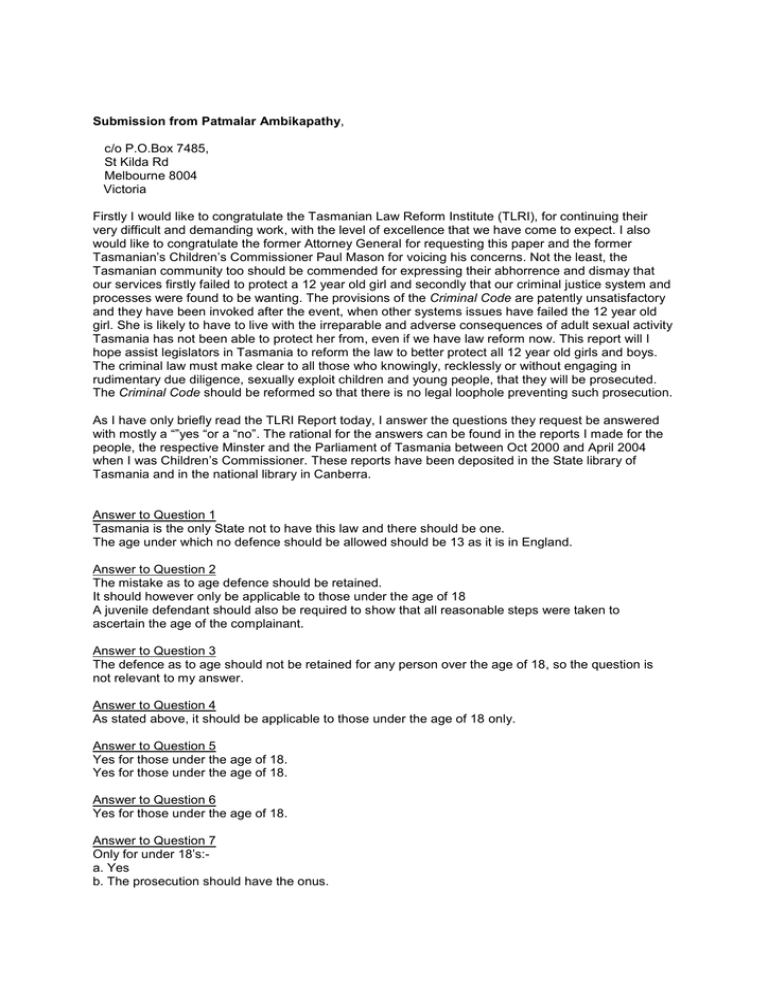
Submission from Patmalar Ambikapathy, c/o P.O.Box 7485, St Kilda Rd Melbourne 8004 Victoria Firstly I would like to congratulate the Tasmanian Law Reform Institute (TLRI), for continuing their very difficult and demanding work, with the level of excellence that we have come to expect. I also would like to congratulate the former Attorney General for requesting this paper and the former Tasmanian’s Children’s Commissioner Paul Mason for voicing his concerns. Not the least, the Tasmanian community too should be commended for expressing their abhorrence and dismay that our services firstly failed to protect a 12 year old girl and secondly that our criminal justice system and processes were found to be wanting. The provisions of the Criminal Code are patently unsatisfactory and they have been invoked after the event, when other systems issues have failed the 12 year old girl. She is likely to have to live with the irreparable and adverse consequences of adult sexual activity Tasmania has not been able to protect her from, even if we have law reform now. This report will I hope assist legislators in Tasmania to reform the law to better protect all 12 year old girls and boys. The criminal law must make clear to all those who knowingly, recklessly or without engaging in rudimentary due diligence, sexually exploit children and young people, that they will be prosecuted. The Criminal Code should be reformed so that there is no legal loophole preventing such prosecution. As I have only briefly read the TLRI Report today, I answer the questions they request be answered with mostly a “”yes “or a “no”. The rational for the answers can be found in the reports I made for the people, the respective Minster and the Parliament of Tasmania between Oct 2000 and April 2004 when I was Children’s Commissioner. These reports have been deposited in the State library of Tasmania and in the national library in Canberra. Answer to Question 1 Tasmania is the only State not to have this law and there should be one. The age under which no defence should be allowed should be 13 as it is in England. Answer to Question 2 The mistake as to age defence should be retained. It should however only be applicable to those under the age of 18 A juvenile defendant should also be required to show that all reasonable steps were taken to ascertain the age of the complainant. Answer to Question 3 The defence as to age should not be retained for any person over the age of 18, so the question is not relevant to my answer. Answer to Question 4 As stated above, it should be applicable to those under the age of 18 only. Answer to Question 5 Yes for those under the age of 18. Yes for those under the age of 18. Answer to Question 6 Yes for those under the age of 18. Answer to Question 7 Only for under 18’s:a. Yes b. The prosecution should have the onus. Answer to Question 8 No Answer to Question 9 a. Yes b. Yes c. No Point 10 Although no answer is required and no question has been asked about the “”age similarity defence” referred to in paragraph 2.2.2 of the Report, I would like to add the following. In Tasmania the age gap for the defence is 5 years and 3 years. It is my view that the age gap should be no more than two years as it is in other jurisdictions. I see no reason why the law should be so different in Tasmania. . I applaud the Report for putting forward strong arguments for the rule of law, the presumption of innocence and of the human rights of accused persons. These are all vital protections in a democracy but are these to take precedence over the safety of children and young people? They need not as children are citizens too and have the right to be properly protected by the law. They have human rights too that we have a duty and obligation to respect. I suggest that they should be of paramount importance in any heirachy of rights under consideration, if we are to give due regard to and consideration of their age and immaturity. Patmalar Ambikapathy 29th June 2012

